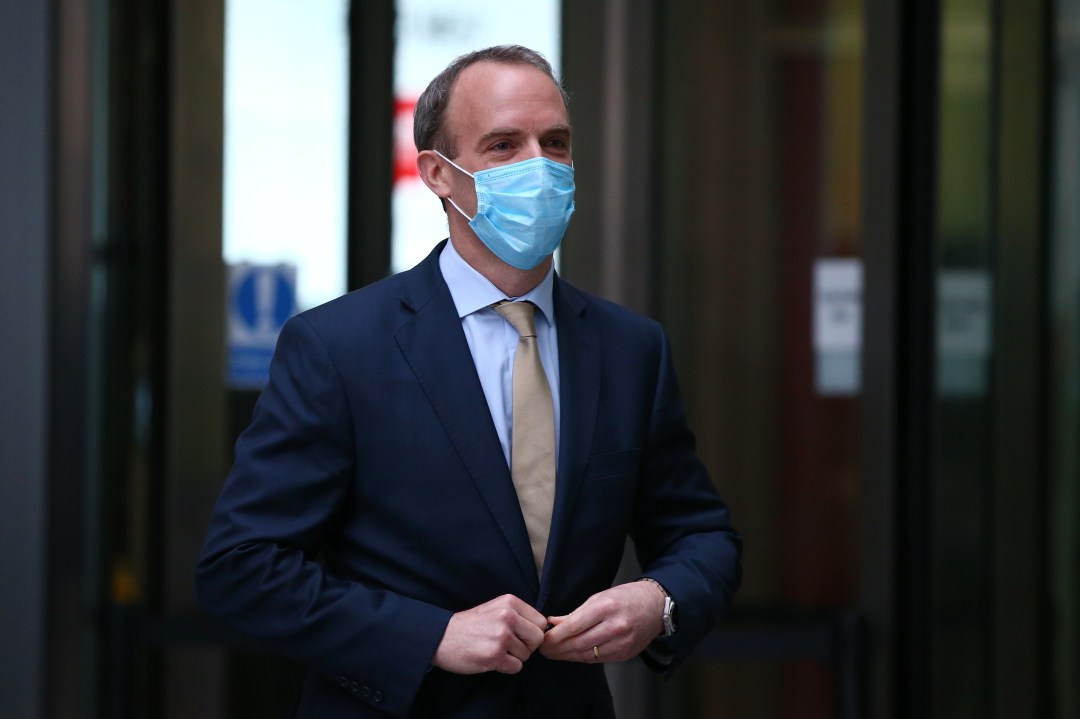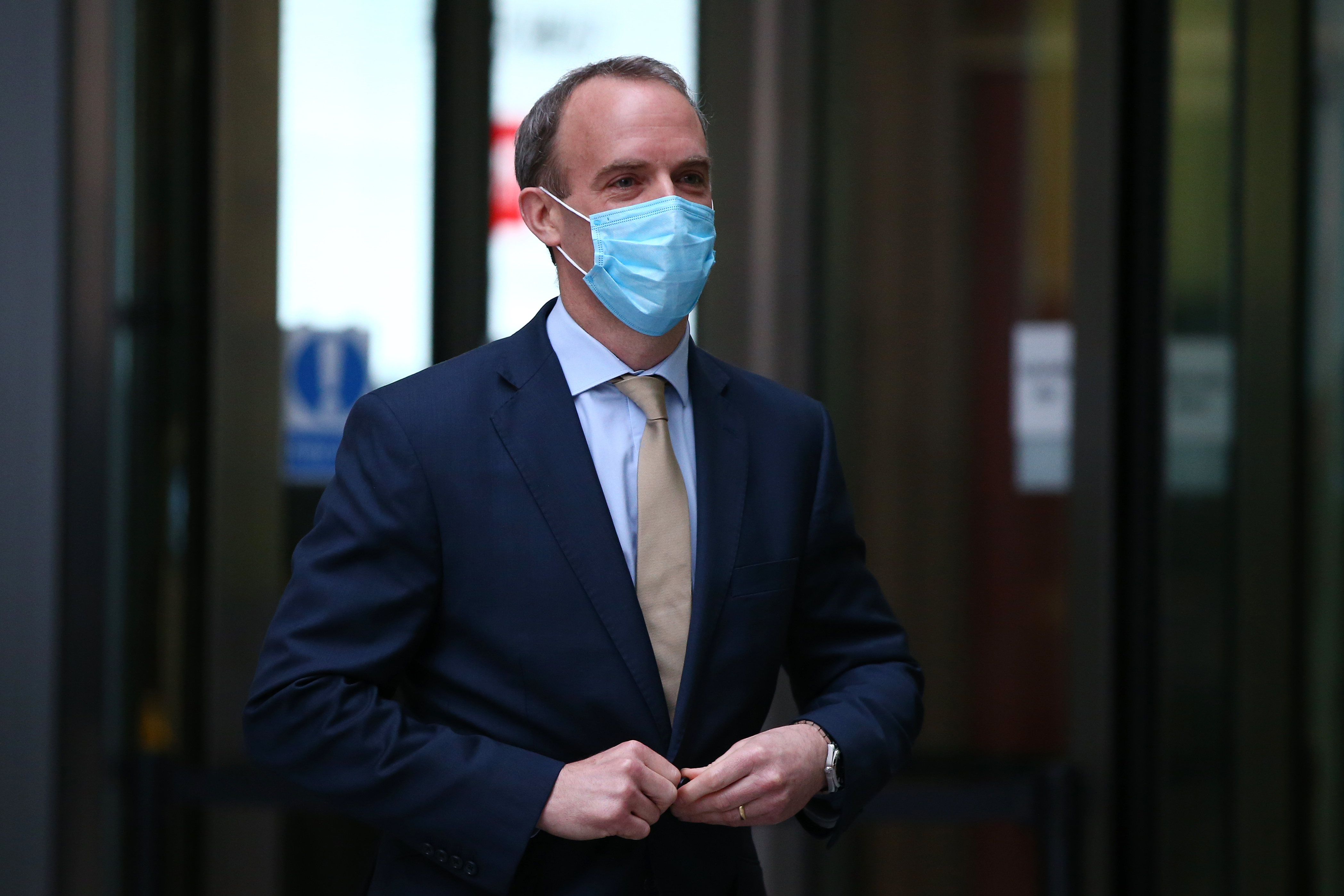With the vaccine rollout exceeding expectations, the government now faces pressure from its own side of the House to lift the current lockdown as fast as possible. The Covid Recovery Group, chaired by the former chief whip Mark Harper, has sent a letter to the PM which has been endorsed by 63 MPs calling for all restrictions to be lifted after the nine designated vulnerable groups have received their vaccines – which is forecast for the end of April. Appearing on Sophy Ridge on Sunday, foreign secretary Dominic Raab set out the government’s position:
DR: I don’t think you can set an arbitrary target, and not be evidence led… which is why [our] review on February 22 is so important… By the end of April [there should be] a further 17 million people offered their first dose… That’s the roadmap we’ve set out. We need to be evidence-based in analysing our progress towards it.
Government ‘aiming’ for schools to re-open on March 8
Raab was hesitant to give any further information on when schools would re-open, including on Ridge’s question as to whether the date for secondary schools may be pushed back. March 8 is the date currently given by the government, but Raab said that this was still provisional:
DR: The Prime Minister will review all the evidence… The aim is to get schools re-opening in a responsible way on March 8… I think we need to wait to evaluate the data carefully… I think we can feel confident that we will be able to start that process on March 8.
Anne Sacoolas’s immunity not based on her CIA role
Ridge also asked about Anne Sacoolas, the American woman who absconded to the United States after her dangerous driving cause the death of 19-year-old Harry Dunn. It was recently reported by the Mail on Sunday that Sacoolas has previously worked as a spy for the CIA, and if working as such, she would not be covered by diplomatic immunity. Raab denied that she has been a CIA operative while she was in the UK:
DR: The basis of her immunity was as the partner of an officer at [RAF Croughton]… We sought her return under extradition and we continue to do so, and of course I have raised it with the new US Secretary of State.
John Watson – Covid lab escape ‘not ruled out’
Andrew Marr spoke to John Watson, a professor at the Centre for Infection Disease Surveillance, and formerly England’s deputy chief medical officer. Watson is part of the World Health Organisation’s Wuhan Covid investigation team, and gave Marr his initial analysis of the virus’s origins:
JW: The infection got to humans probably though an intermediate host… that would allow it the opportunity to spread to humans. That, we think is the most likely [scenario].
AM: So, to be clear, the possibility that this escaped from one of the big Wuhan research institutes and laboratories is not ruled out?
JW: It is not ruled out, that is correct.
Investigators saw ‘a certain amount of the raw data’
Marr picked up on Watson’s comment that his team saw ‘a certain amount’ of the raw patient data from early cases of the virus in Wuhan. One member of the team, the microbiologist Dominic Dwyer, has said that the summary they received from the Chinese authorities was inadequate for the purposes of their mission:
JW: We saw a certain amount of the raw data.
AM: Your colleague Dominic Dwyer… said: ‘They showed us a couple of examples, but that’s not the same as doing all of them, which is standard epidemiological investigation’.
JW: …There was a lot of sharing of raw data in the various areas we were looking at… There are more data that we would like to see, and it would be easier if we had that, but this is really just the start of a process.
China ‘by no means necessarily’ where transmission started
Marr asked Watson if he could be certain that China was the original epicentre of the pandemic:
JW: No… China is a very, very possible source for the outbreak, but is by no means necessarily the place where the leak from animals to humans took place… and we need to ensure that we are looking beyond the borders of China, as well as within China.
Mark Drakeford – UK should ‘build the wall higher’ to protect against virus
Ridge spoke to the first minister of Wales Mark Drakeford, who told her that he would have approached the UK’s border policy in a very different way to how it has been handled so far:
MD: The UK government’s approach has been to say everybody can come in, other than people [from countries] on ‘the red list’. I would have said nobody can come in, other than a list of countries where we are absolutely sure that it is safe… I just feel that we need to build the wall higher to make sure that we are not vulnerable to new variants.
Bridget Phillipson – UK risks ‘seeing businesses go bust’
Times Radio’s Gloria de Piero interviewed the Shadow Chief Secretary to the Treasury Bridget Phillipson, who put the case for relaxing the repayments on the loans that businesses have taken out in order to get through the pandemic, and suggested a system closer to that of a student loan scheme:
BP: We’ve heard from so many businesses that they’re absolutely drowning under this debt that they’ve had to take on to get through. They need greater support… so we think that businesses should be paying it back until they’re in a much stronger position to do so.
Tim Spector – Delaying second shot ‘looks like it’s paying off’
Tim Spector, a professor of genetic epidemiology at King’s College London, said that the government’s decision to spread out the vaccine doses to try and cover more people sooner is being vindicated:
TS: We’re still analysing the results every week as people give us more data… [but] it’s looking very promising, and the government’s approach of delaying the second shot in order to get more people vaccinated looks like it’s paying off.
Not updating Covid symptoms is ‘a risk we are ignoring’
And finally, Spector, who is responsible for developing the ZOE Covid Symptom Tracker app, said that the current three criteria – a cough, a fever or loss of smell and taste – needed to get a test were not quite enough, especially as the virus begins to evolve:
TS: We’ve been saying since last spring that the range of symptoms should be expanded… There are other symptoms of Covid that are linked… 30 per cent of people who have a positive test… do not have those classic symptoms… It’s a real risk that we are ignoring.







Comments